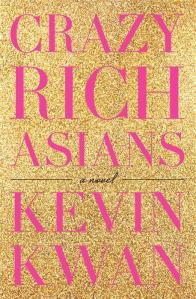 I suppose the title says it all really, as well as the cover art which is sparkly gold. The debut novel from Singaporean native Kevin Kwan is a funny, light and enjoying read. Set largely in Singapore, the novel follows the rich and famous as they descend into the small island country for the wedding of the year – the son of one of the richest families marrying a famous model whose family comes from ‘new’ money. We follow Nicholas Young who, having been educated overseas and is now an up-and-coming professor at Stanford University, invites his ABC (American Bord Chinese) girlfriend Rachael to Singapore for the wedding and to meet his family. Away from the craziness of his insanely wealthy family and extended family, Nick innocently lures Rachel into a minefield of cattiness and snobbery of the highest kind (coming from Mainland China is the biggest sin of all). The novel is filled with couture clothing totalling over millions, lots of private jets and first class flying, penny pinching, penthouses, royal Thai-maids, Gurkhas and other expensive frivolities that makes you hope that excesses such as these are not actually real.
I suppose the title says it all really, as well as the cover art which is sparkly gold. The debut novel from Singaporean native Kevin Kwan is a funny, light and enjoying read. Set largely in Singapore, the novel follows the rich and famous as they descend into the small island country for the wedding of the year – the son of one of the richest families marrying a famous model whose family comes from ‘new’ money. We follow Nicholas Young who, having been educated overseas and is now an up-and-coming professor at Stanford University, invites his ABC (American Bord Chinese) girlfriend Rachael to Singapore for the wedding and to meet his family. Away from the craziness of his insanely wealthy family and extended family, Nick innocently lures Rachel into a minefield of cattiness and snobbery of the highest kind (coming from Mainland China is the biggest sin of all). The novel is filled with couture clothing totalling over millions, lots of private jets and first class flying, penny pinching, penthouses, royal Thai-maids, Gurkhas and other expensive frivolities that makes you hope that excesses such as these are not actually real.
What I also loved about the novel is also the excellent introduction to Singapore. While the book is a story of the insanely rich upper crust of Singaporean society, it is also a love story to the country especially to its food. As a lover of Malay and Singaporean food (especially Hawker food), this book had me salivating all the way through. Kwan also integrates Singaporean colloquialisms into his character’s speech and adds interesting little footnotes to explain them.
A fun read and perhaps one of the first books to parody the rise (or shine the spotlight) on the insanely wealthy Asians and the new generation of ‘new money’ coming from China.
